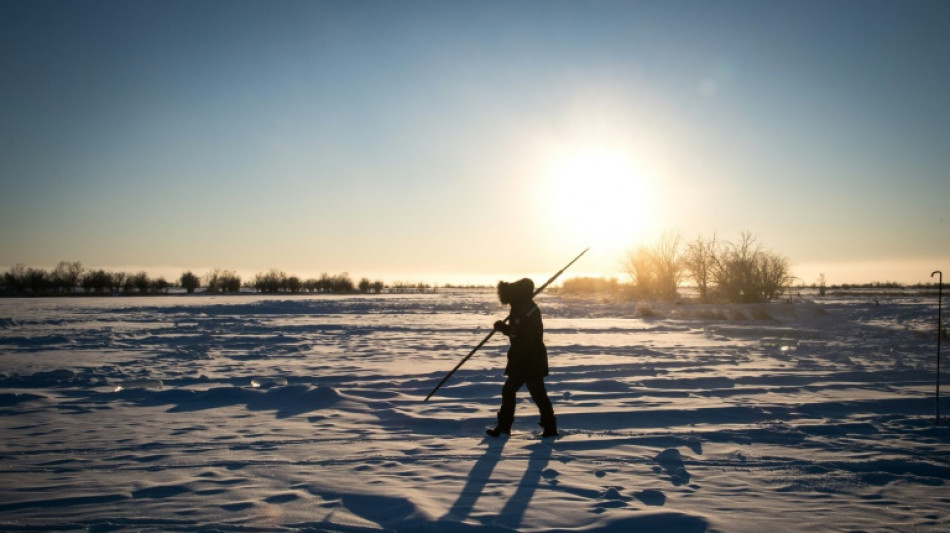
-
 Szoboszlai plays hero and villain in Liverpool's FA Cup win
Szoboszlai plays hero and villain in Liverpool's FA Cup win
-
Hawaii's Kilauea volcano puts on spectacular lava display
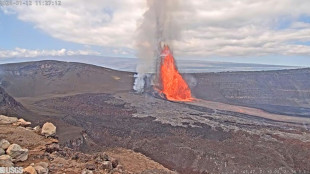
-
 US stocks at records despite early losses on Fed independence angst
US stocks at records despite early losses on Fed independence angst
-
Koepka rejoins PGA Tour under new rules for LIV players

-
 Ex-France, Liverpool defender Sakho announces retirement
Ex-France, Liverpool defender Sakho announces retirement
-
Jerome Powell: The careful Fed chair standing firm against Trump

-
 France scrum-half Le Garrec likely to miss start of Six Nations
France scrum-half Le Garrec likely to miss start of Six Nations
-
AI helps fuel new era of medical self-testing

-
 Leaders of Japan and South Korea meet as China flexes muscles
Leaders of Japan and South Korea meet as China flexes muscles
-
Trump sets meeting with Venezuelan opposition leader, Caracas under pressure

-
 Australia captain Alyssa Healy to retire from cricket
Australia captain Alyssa Healy to retire from cricket
-
US 'screwed' if Supreme Court rules against tariffs: Trump

-
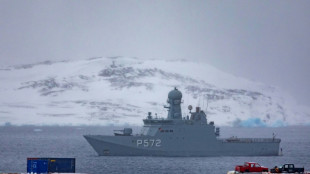 NATO, Greenland vow to boost Arctic security after Trump threats
NATO, Greenland vow to boost Arctic security after Trump threats
-
Israel to take part in first Eurovision semi-final on May 12

-
 How Alonso's dream Real Madrid return crumbled so quickly
How Alonso's dream Real Madrid return crumbled so quickly
-
Ex-Fed chiefs, lawmakers slam US probe into Jerome Powell

-
 Former Panama leader on trial over mega Latin America corruption scandal
Former Panama leader on trial over mega Latin America corruption scandal
-
Trump keeping Iran air strikes on the table: White House

-
 Paramount sues in hostile bid to buy Warner Bros Discover
Paramount sues in hostile bid to buy Warner Bros Discover
-
Ugandan opposition leader Bobi Wine warns of protests if polls rigged

-
 Airbus delivers more planes in 2025
Airbus delivers more planes in 2025
-
Alonso leaves Real Madrid, Arbeloa appointed as coach

-
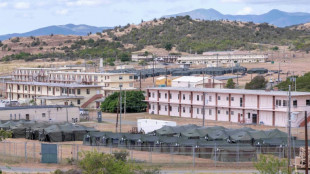 UK pays 'substantial' compensation to Guantanamo inmate: lawyer
UK pays 'substantial' compensation to Guantanamo inmate: lawyer
-
Iran protest toll mounts as government stages mass rallies

-
 Gold hits record high, dollar slides as US targets Fed
Gold hits record high, dollar slides as US targets Fed
-
Cuba denies being in talks with Trump on potential deal

-
 Scientists reveal what drives homosexual behaviour in primates
Scientists reveal what drives homosexual behaviour in primates
-
Venezuela releases more political prisoners as pressure builds

-
 15,000 NY nurses stage largest-ever strike over conditions
15,000 NY nurses stage largest-ever strike over conditions
-
Rosenior plots long Chelsea stay as Arsenal loom

-
 Zuckerberg names banker, ex-Trump advisor as Meta president
Zuckerberg names banker, ex-Trump advisor as Meta president
-
Reza Pahlavi: Iran's ex-crown prince dreaming of homecoming

-
 Venezuela releases more political prisoners
Venezuela releases more political prisoners
-
Kenya's NY marathon champ Albert Korir gets drug suspension

-
 US prosecutors open probe of Fed chief, escalating Trump-Powell clash
US prosecutors open probe of Fed chief, escalating Trump-Powell clash
-
Russian captain in fiery North Sea crash faces UK trial
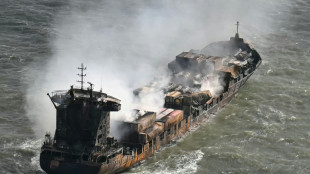
-
 Carrick is frontrunner for interim Man Utd job: reports
Carrick is frontrunner for interim Man Utd job: reports
-
Iran government stages mass rallies as alarm grows over protest toll

-
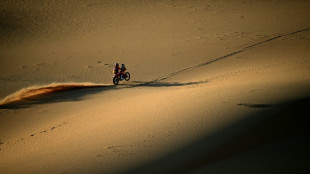 Variawa leads South African charge over Dakar dunes
Variawa leads South African charge over Dakar dunes
-
Swiss inferno bar owner detained for three months

-
 Heathrow airport sees record high annual passenger numbers
Heathrow airport sees record high annual passenger numbers
-
Georgia jails ex-PM for five years amid ruling party oustings

-
 Kyiv buries medic killed in Russian drone strike
Kyiv buries medic killed in Russian drone strike
-
Israel revokes French researcher's travel permit

-
 India and Germany seek to boost defence industry ties
India and Germany seek to boost defence industry ties
-
French coach and football pundit Rolland Courbis dies at 72

-
 UK regulator opens probe into X over sexualised AI imagery
UK regulator opens probe into X over sexualised AI imagery
-
AFCON organisers investigate incidents after Algeria-Nigeria clash

-
 US Fed chief warns of 'intimidation' after criminal subpoenas
US Fed chief warns of 'intimidation' after criminal subpoenas
-
Gold hits record high, dollar falls as US targets Fed


Sink to source: Arctic is now emitting more carbon than it absorbs
After locking carbon dioxide in its frozen soil for millennia, the Arctic tundra is undergoing a dramatic transformation, driven by frequent wildfires that are turning it into a net source of carbon dioxide emissions, a US agency said Tuesday.
This stark shift is detailed in the National Oceanic and Atmospheric Administration's 2024 Arctic Report Card, which revealed that annual surface air temperatures in the Arctic this year were the second-warmest on record since 1900.
"Our observations now show that the Arctic tundra, which is experiencing warming and increased wildfire, is now emitting more carbon than it stores, which will worsen climate change impacts," said NOAA Administrator Rick Spinrad.
The finding is based on average of observations recorded from 2001-2020.
Climate warming exerts dual effects on the Arctic. While it stimulates plant productivity and growth, which remove carbon dioxide from the atmosphere, it also leads to increased surface air temperatures that cause permafrost to thaw.
Thawing permafrost releases carbon previously trapped in frozen soil as carbon dioxide and methane -- two potent greenhouse gases -- through microbial decomposition.
In 2024, Alaska recorded its second-warmest permafrost temperatures on record, the report said.
Human-caused climate change is also intensifying high-latitude wildfires, which have increased in burned area, intensity, and associated carbon emissions.
Wildfires not only combust vegetation and soil organic matter, releasing carbon into the atmosphere, but they also strip away insulating soil layers, accelerating long-term permafrost thaw and its associated carbon emissions.
Since 2003, circumpolar wildfire emissions have averaged 207 million tons of carbon annually, according to NOAA. At the same time, Arctic terrestrial ecosystems have remained a consistent source of methane.
"Last year, 2023, was the largest fire year on record due to Canadian wildfires, which burned more than twice any other year on record in Canada," report co-author Brendan Rogers said during a press conference.
The fires emitted nearly 400 million tons of carbon -- more than two-and-a-half times the emissions from all other sectors in Canada combined, he added.
Meanwhile, 2024 ranked as the second-highest year for wildfire emissions within the Arctic Circle.
- 'Alarming harbinger' -
Asked whether the Arctic's shift from carbon sink to source might be permanent, Rogers said it remains an open question. While boreal forests further south still serve as carbon sinks, northern regions are of greater concern.
"There is definitely interannual variability," he emphasized. "What I'm reporting on here is the average condition we've seen over a 20 year period."
Reacting to the news, Brenda Ekwurzel, a climate scientist at the Union of Concerned Scientists said that "the climate catastrophe we're seeing in the Arctic is already bringing consequences for communities around the world."
"The alarming harbinger of a net carbon source being unleashed sooner rather than later doesn't bode well. Once reached, many of these thresholds of adverse impacts on ecosystems cannot be reversed."
As well as warmer, the Arctic is also growing wetter, with summer 2024 seeing the most rainfall on record.
The trend accelerates coastal erosion, threatening Indigenous communities reliant on stable ice and traditional hunting practices.
Warmer temperatures are impacting wildlife too, with the report finding tundra caribou numbers have decreased by 65 percent over the past two to three decades -- with summer heat disrupting their movements and survival, alongside changes to winter snow and ice conditions.
Surprisingly, however, Alaska's ice seal populations remain healthy.
The report found no long-term negative impacts on body condition, age of maturity, pregnancy rates, or pup survival for the four species of ice seals -- ringed, bearded, spotted, and ribbon -- inhabiting the Bering, Chukchi, and Beaufort seas.
N.Shalabi--SF-PST



